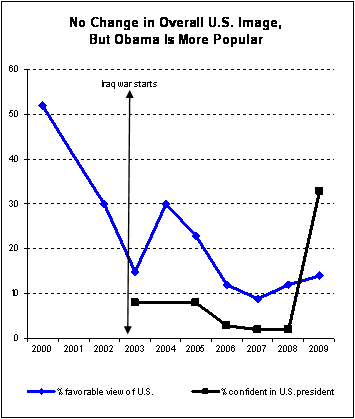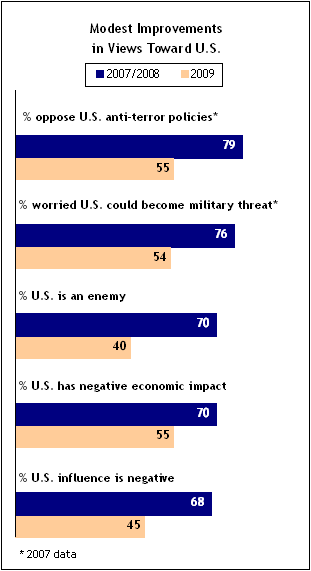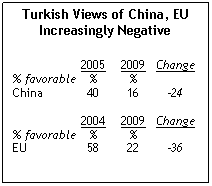by Richard Wike, Associate Director, Erin Carriere-Kretschmer, Senior Researcher, Pew Global Attitudes Project
 The Obama administration has exerted a considerable amount of diplomatic energy on Turkey: Secretary of State Hillary Clinton visited there in March, the president himself followed in April and next week Turkish Prime Minister Recep Tayyip Erdogan will call on the White House. Nonetheless, the administration continues to face serious challenges in this strategically important nation. While overall ratings for the U.S. have improved throughout much of the world, in Turkey they remain dismal — only 14% of Turks expressed a positive view of the U.S. in the spring 2009 Pew Global Attitudes survey, the lowest rating among the 25 nations included in the poll.
The Obama administration has exerted a considerable amount of diplomatic energy on Turkey: Secretary of State Hillary Clinton visited there in March, the president himself followed in April and next week Turkish Prime Minister Recep Tayyip Erdogan will call on the White House. Nonetheless, the administration continues to face serious challenges in this strategically important nation. While overall ratings for the U.S. have improved throughout much of the world, in Turkey they remain dismal — only 14% of Turks expressed a positive view of the U.S. in the spring 2009 Pew Global Attitudes survey, the lowest rating among the 25 nations included in the poll.
Still, there are modest signs of a potential for improvement. While just one-third of Turks have confidence that President Obama will do the right thing in world affairs, this is a significant increase from 2008, when only 2% voiced confidence in then-President Bush. And while most Turks continue to oppose U.S.-led anti-terrorism efforts and most still believe the U.S. could be a military threat to their country some day, these views are less common than they were in the waning years of the Bush administration.
As the survey reveals, the U.S. is not the only major power receiving negative reviews in Turkey — China, Russia and the European Union also get poor ratings.
U.S. Image Remains Negative
Turkish views of the U.S. have not always been so downbeat. U.S. State Department polling from the beginning of this decade found just over half (52%) of Turks expressing a favorable opinion of the U.S. However, the widely unpopular Iraq war led to a steep decline in America’s image, and it has essentially never recovered.
Similarly, views of the American people remain low in Turkey — just 14% say they have a favorable opinion of Americans. As with ratings of the U.S. overall, Turkey’s is the lowest rating among the 25 nations surveyed.
Concerns about American unilateralism also continue. Just 15% of Turks think the U.S. considers the interests of countries like theirs when making foreign policy decisions — again, the lowest percentage among the countries surveyed.
A Few Promising Signs
 As noted above, there are some indications that Turkish views of the U.S., and of American foreign policy, are turning less negative. For instance, in 2007, 79% opposed U.S.-led efforts to combat terrorism, compared with 55% in 2009.
As noted above, there are some indications that Turkish views of the U.S., and of American foreign policy, are turning less negative. For instance, in 2007, 79% opposed U.S.-led efforts to combat terrorism, compared with 55% in 2009.
Similarly, fewer Turks now see the U.S. as a potential military threat. Just over half (54%) say the U.S. could pose a military threat to their country some day — a rather striking finding, since Turkey is a longtime NATO ally of the U.S. However, this is down significantly from 76% two years ago.
And while four-in-ten still consider the U.S. an enemy of their country, this is a sharp decrease from 70% in the 2008 poll.
In addition, fewer Turks now characterize America’s influence in their country as negative. Last year, seven-in-ten said the U.S. economy was having a harmful effect on the Turkish economy; this year, 55% expressed this view. In 2008, 68% described America’s overall impact in their country as negative, compared with 45% today.
Dim Views of Other Major Powers
 One point to keep in mind about the largely negative ratings the U.S. has received in Turkey over the last few years is that America is not alone in this regard. Other major powers also receive harsh assessments from the Turkish public.
One point to keep in mind about the largely negative ratings the U.S. has received in Turkey over the last few years is that America is not alone in this regard. Other major powers also receive harsh assessments from the Turkish public.
In the 2009 survey, just 16% expressed a favorable view of China, down from 40% in 2005. Frustration with stagnated negotiations to admit Turkey into the European Union is also reflected in the survey data — 22% said they had a positive opinion of the EU in the 2009 poll, down 36 percentage points from five years ago. Russia fares even worse than China or the EU: only 13% of Turks gave it a favorable rating.


